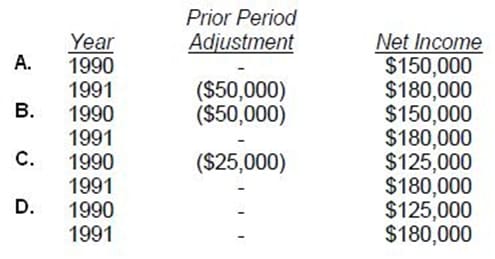Exam Details
Exam Code
:CPA-TESTExam Name
:Certified Public Accountant Test: Auditing and Attestation, Business Environment and Concepts, Financial Accounting and Reporting, RegulationCertification
:AICPA CertificationsVendor
:AICPATotal Questions
:1241 Q&AsLast Updated
:Jun 30, 2025
AICPA AICPA Certifications CPA-TEST Questions & Answers
-
Question 91:
Reclassification adjustments must be shown in the financial statement that discloses comprehensive income:
A. To show what portion of comprehensive income is from the realization of current assets.
B. To show the tax effect of items of comprehensive income.
C. To avoid double counting in comprehensive income items, which are currently displayed in net income.
D. To avoid including transactions with shareholders in items of comprehensive income.
-
Question 92:
ABC Co. reported a retained earnings balance of $400,000 at December 31, 1991. In August 1992, ABC determined that insurance premiums of $60,000 for the three-year period beginning January 1, 1991, had been paid and fully expensed in 1991. ABC has a 30% income tax rate. What amount should ABC report as adjusted beginning retained earnings in its 1992 statement of retained earnings?
A. $420,000
B. $428,000
C. $440,000
D. $442,000
-
Question 93:
ABC, Inc. reported a retained earnings balance of $150,000 at December 31,1990. In June 1991, ABC discovered that merchandise costing $40,000 had not been included in inventory in its 1990 financial statements. ABC has a 30% tax rate. What amount should ABC report as adjusted beginning retained earnings in its statement of retained earnings at December 31, 1991?
A. $190,000
B. $178,000
C. $150,000
D. $122,000
-
Question 94:
On January 2, 1991, ABC, Inc. agreed to pay its former president $300,000 under a deferred compensation arrangement. ABC should have recorded this expense in 1990 but did not do so. ABC's reported income tax expense would have been $70,000 lower in 1990 had it properly accrued this deferred compensation in its December 31,1991, financial statements, ABC should adjust the beginning balance of its retained earnings by a:
A. $230,000 credit.
B. $230,000 debit.
C. $300,000 credit.
D. $370,000 debit.
-
Question 95:
On August 31, 1992, ABC Co. decided to change from the FIFO periodic inventory system to the weighted
average periodic inventory system. ABC is on a calendar year basis. The cumulative effect of the change is determined:
A. As of January 1, 1992.
B. As of August 31, 1992.
C. During the eight months ending August 31, 1992, by a weighted average of the purchases.
D. During 1992 by a weighted average of the purchases.
-
Question 96:
While preparing its 1991 financial statements, ABC Corp. discovered computational errors in its 1990 and 1989 depreciation expense. These errors resulted in overstatement of each year's income by $25,000, net of income taxes. The following amounts were reported in the previously issued financial statements:

ABC's 1991 net income is correctly reported at $180,000. Which of the following amounts should be reported as prior period adjustments and net income in ABC's 1991 and 1990 comparative financial statements?

A. Option A
B. Option B
C. Option C
D. Option D
-
Question 97:
In 1990, ABC Co. changed from the individual item approach to the aggregate approach in applying the lower of FIFO cost or market to inventories. The cumulative effect of this change should be reported in ABC's financial statements as a:
A. Retrospective adjustment on the retained earnings statement, with separate disclosure.
B. Component of income from continuing operations, with separate disclosure.
C. Component of income from continuing operations, without separate disclosure.
D. Component of income after continuing operations, with separate disclosure.
-
Question 98:
In single period statements, which of the following should not be reflected as an adjustment to the opening balance of retained earnings?
A. Effect of a failure to provide for uncollectible accounts in the previous period.
B. Effect of a decrease in the estimated useful life of depreciable equipment.
C. Cumulative effect of a change from the percentage of completion to the completed contract method of accounting for long-term construction projects.
D. Cumulative effect of a change from LIFO to FIFO in valuing merchandise inventory.
-
Question 99:
Earnings per share data should be reported on the income statement for:

A. Option A
B. Option B
C. Option C
D. Option D
-
Question 100:
The effect of a change in accounting principle that is inseparable from the effect of a change in accounting estimate should be reported:
A. By restating the financial statements of all prior periods presented.
B. As a correction of an error.
C. As a component of income from continuing operations, in the period of change and future periods if the change affects both.
D. As a separate disclosure after income from continuing operations, in the period of change and future periods if the change affects both.
Tips on How to Prepare for the Exams
Nowadays, the certification exams become more and more important and required by more and more enterprises when applying for a job. But how to prepare for the exam effectively? How to prepare for the exam in a short time with less efforts? How to get a ideal result and how to find the most reliable resources? Here on Vcedump.com, you will find all the answers. Vcedump.com provide not only AICPA exam questions, answers and explanations but also complete assistance on your exam preparation and certification application. If you are confused on your CPA-TEST exam preparations and AICPA certification application, do not hesitate to visit our Vcedump.com to find your solutions here.


